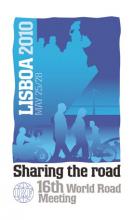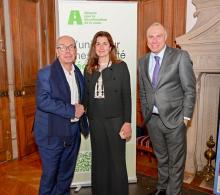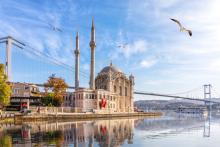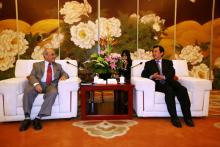International Road Community Rises to the Challenge of Safe, Smart and Sustainable Mobility. Songs are like roads - highways to the heart - opening new vistas, new challenges and new opportunities." Singer, Mafalda Arnault's words during a splendidly moving opening ceremony were an apt introduction to the spirit and achievements of what proved a highly successful 16th IRF World Meeting in Lisbon. A capacity audience clapping in unison to the soulful sounds of Fado was symbolic of an industry showing it can

Fado star Mafalda Arnaulth entrances delegates at the Opening Ceremony
International Road Community Rises to the Challenge of Safe, Smart and Sustainable Mobility
Songs are like roads - highways to the heart - opening new vistas, new challenges and new opportunities." Singer, Mafalda Arnault's words during a splendidly moving opening ceremony were an apt introduction to the spirit and achievements of what proved a highly successful 16thA capacity audience clapping in unison to the soulful sounds of Fado was symbolic of an industry showing it can come together around common planetary causes - literally helping to pave a road map to a more sustainable future.
Despite last minute threats of travel disruption from volcanic ash clouds over Europe, the World Meeting attracted record participation and unprecedented international interest, highlighting an industry emerging strengthened from a period of economic downturn and ready to embark on a new decade of innovation and opportunity.
Thanks to a dynamic organisational team, backed up by the vision and support of some 180 technical partners and 23 sponsors, upwards of 1,200 of the world's foremost road experts and industry leaders, from 82 countries, were able to gather in Lisbon for authoritative dialogue on the new mobility, transport and infrastructure challenges of our times.
Over the course of four intensive but highly rewarding days, from 25-28 May, the World Meeting united the sector's collective wisdom and experience to reaffirm the vital role roads play at the forefront of global efforts to promote both trade and sustainable development. A comprehensive programme of panel discussions thoroughly explored and developed practical responses across five core topics: Infrastructure, Road Safety, Green Roads, Financing and Technology.
Over 275 technical papers provided eminent empirical evidence that increased personal mobility can be decoupled from traffic accidents, congestion and environmental pollution, provided appropriate policies are adopted and innovation actively encouraged.
The overarching theme of the event, Sharing the Road, provided a call for stakeholders - industry, users and public authorities - everywhere to define and promote policies that reconcile mobility needs with legitimate aspirations for cleaner, safer and smarter transport.
An astounding 29 million kilometres of roads crisscross our planet, yet these are unevenly distributed and insufficiently preserved. While millions still lack access to safe, clean and affordable transport, others are faced daily with mounting congestion, increased trading costs and untold personal tragedies resulting from the 3,000 lives lost each day on the world's roads.
Keynote institutional and industry speakers all noted that these societal issues must be addressed through inclusive policies and measures. They called for enhanced cross-sector dialogue and infrastructure investments commensurate with the socio-economic benefits of road transport.
"Increasingly, road transport is being recognised as a missing link in global efforts to achieve the UN Millennium Development Goals - and industry can bridge that link," noted the coordinators of the event, Jean-Claude Roffe, and Emanuel Maranha das Neves. "In the face of unprecedented economic turmoil, road investment offers a clear pathway
to recovery." The World Meeting was, indeed, unique in its capacity to complement creative dialogue with a rich array of practical solutions.
Innovation that makes a difference
Innovation abounded in the more than 3,000 sq m of prime exhibition space that formed an integral feature of the World Meeting, featuring 100 prominent exhibitors from 20 countries, representing the principal components of the sector and the major supplying regions of the world. National pavilions covering countries as diverse as India, Spain and Saudi Arabia offered an integrated showcase of transport programmes and technological innovation.This extensive display included solutions geared to keeping traffic in motion, whether through free-flow tolling systems, dynamic displays that provide real-time guidance to the traveller or movable separations that add peak-time traffic capacity.
Safety was another major area of innovation with a range of complementary systems that included urban pavement surfaces with vastly improved wet-braking properties, reflective signalling that focuses driver attention and passive safety systems that mitigate the severity of road run-offs.
The industry-wide commitment to sustainability targets manifested in Lisbon cannot be overstated. Making the best possible use of existing road assets is a moral and economic imperative at a time when budget cutbacks and greenhouse gas targets have become the new norm.
The meeting emphasised that overcoming these challenges requires innovative forms of collaboration between transport authorities and private sector actors. Public deficit issues are encouraging policy makers everywhere to explore new types of Public-Private Partnerships to achieve benefits, which would most probably not have materialised using traditional financing of road works.
Delegates stressed that co-benefits should be exploited wherever possible: innovative road construction and maintenance technologies additionally help address the issue of safety and financing by reducing overall project costs and offering users a safer driving environment.
A special session, jointly hosted by IRF and the World Road Association (PIARC), was devoted to the continuing education of road managers and supervisors in the public and private sectors.
Throughout the 16th IRF World Meeting, the road community comprehensively reaffirmed the depth of its vision and commitment to leading the way as an essential and dynamic actor in global efforts to address the challenges of our times proactively and decisively.
Above all, the conclusions from Lisbon clearly demonstrated the massive potential of roads to serve as exemplary vectors of exchange and development, creating both wealth and sustained growth.










